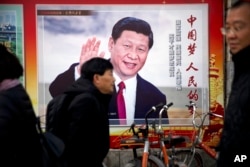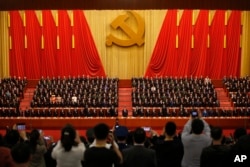The Chinese Communist Party is increasingly engaged in efforts to extend its propaganda reach, looking far beyond newsrooms and now spreading into an entertainment game show.
One of the country’s largest television networks recently aired a new quiz show about the life and political doctrine of top leader Xi Jinping, known officially as “Xi Jinping Thought on Socialism with Chinese Characteristics for a New Era,” or more simply, “Xi Jinping Thought.”
But such blunt efforts to spread socialist theory are no longer always accepted as normal and this one has sparked a backlash online.
Online backlash
“Haven’t we had enough positive energy from [shows trumpeting the idea of] New China? Give me a break, these top [Communist] leaders!” one user complained on Weibo – the equivalent of Twitter in China – in response to the posting of a new prime-time program on Hunan TV – the second most watched channel in China.
“The audience won’t like it. Let’s just wait and see the ratings to drop,” another Weibo user wrote.
While some called the show “poisonous,” others took it lightly on Weibo, saying such displays of socialist doctrine have been common during the week-long National Day holiday in China.
Since Sunday, Hunan TV, which is widely popular among the younger generation for its entertainment shows and dramas, has aired the first of its kind, five-episode show, titled "Studying Xi in the New Era."
With its slick format, futuristic elements and the participation of young contestants, the show is the CCP’s latest effort to instill “Xi Thought” into the minds of young people, who have grown up more exposed to foreign influences than to Chinese socialist teachings, analysts say.
Party propaganda
“It is not a matter [of] popularity. It is about propaganda, it’s about how to let Xi Jinping appear everywhere, using a more entertaining way and a more-easy-to-get-into-your-home-television way to spread Xi Jinping Thoughts,” said Bruce Lui, an award-winning former reporter and currently a senior lecturer of journalism at Hong Kong Baptist University.
The show, he added, also puts an end to the low profile that Xi sought to keep earlier out of concern that some might blame him for triggering the U.S.-China trade dispute.
The network’s spokesperson did not answer VOA’s repeated calls for comment.
Since “Xi Thought” was added to China’s constitution in March, a wave of campaigns to study the theory has been rolled out across the country among local party chapters, schools and universities, on state media and even in churches.
Changing viewers’ thoughts?
But whether the campaigns including the latest game show have achieved their desired outcomes is in doubt.
“In most cases, news media are unable to change viewers’ stance. More often, they can only reinforce their existing views. In other words, those who welcome it (Xi Thoughts) will look out for such shows to watch while those who don’t, may find it unacceptable,” said Xu Huiming, an associate professor of journalism at Guangzhou University.
The quiz show and a recent outburst by a state media reporter in London has showed that, as China’s profile in the world grows, it has turned even more aggressive in spreading its socialist way of thinking both at home and abroad, Lui added.
On Sunday, a CCTV London-based correspondent, Kong Linlin, allegedly heckled a speaker at the UK Conservative party’s conference and called other panelists including pro-democracy activists from Hong Kong “traitors.”
She was briefly arrested on suspicion of assault after allegedly slapping a conference volunteer, who asked her to leave the event on eroding freedoms in Hong Kong under Chinese rule, according to a video clip circulated on the Internet.
China’s increasing aggression overseas
While the event’s organizer called Kong’s outburst a sign of China’s increasing aggression and bullying beyond its borders, the Chinese Embassy in London did not hesitate to endorse what the Chinese journalist and Chinese officials described as her own demand for freedom of speech, saying “she was simply raising a question and expressing her opinions.”
Embassy officials called the organizers’ handling of the matter “completely unacceptable.”
The incident has highlighted the differing views toward the role of journalists in China, said professor Xu.
Unlike those in the West, Xu said, “journalists in China are educated to serve the party. They are seen as an extension of the party as quoted by words of [late Soviet leader] Vladimir Lenin, who once said the press was an integral part of the party apparatus.”
Xu said that makes them appear more like government propaganda workers than journalists representing a free press.
HK freedom erosion
Lui said many in China who have an uncensored understanding of what Kong did on Sunday would agree that her behavior was unprofessional and irrational, although her outburst has won her acclaims and vocal support among more nationalistic Chinese netizens operating in an environment of censorship.
He added that China’s increasing aggression has posed a serious threat to Hong Kong’s long-honored freedom of press and speech as discussion grows on the territory’s future. Political debate on one-party rule is now considered a taboo.
“We’ve seen more and more red lines from Beijing to Hong Kong. We cannot talk about this, cannot talk about that,” he said. “So, we’re facing a harder and harder atmosphere of freedom of expression.”










